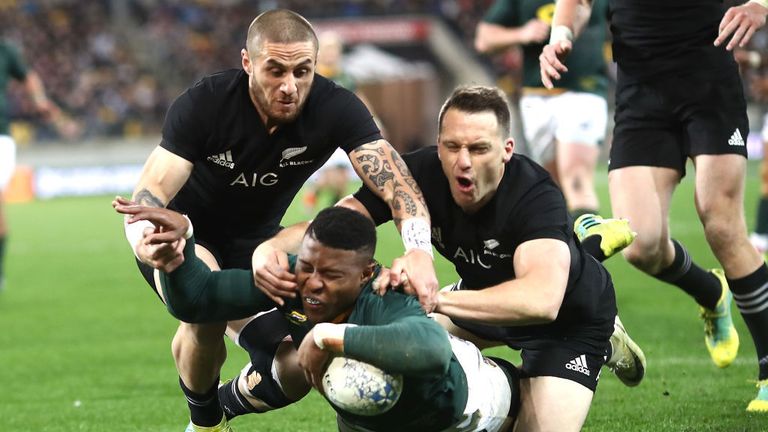“It’s a big blow,” Springboks coach Rassie Erasmus told the media in Yokohama after naming his side for the World Cup semi-final against Wales, which was missing the injured Cheslin Kolbe.
“Everybody knows the quality of player he is and the contribution he has made,” Erasmus continued.
Kolbe had been one of the Boks’ most important players in Japan – without question the biggest attacking threat. That was evident when he returned a week later for the final against England, stepping through the tackle of an upended Owen Farrell with just over five minutes remaining to score the try that delivered South Africa’s third World Cup title.
Given how vital the man born in Kraaifontein was to Erasmus and his gameplan, it’s difficult to fathom that a little over a year before the tournament started, Kolbe was uncapped at international level.
In fact, he was so far from selection in 2018 that when Siya Kolisi made history as the first black captain of the Springboks on June 9 of that year, Kolbe was sitting in the stands alongside all the other fans.
“Siya is a close friend of mine and we flew up that weekend to Johannesburg just to go and support him and support the team,” Kolbe told Sky Sports.
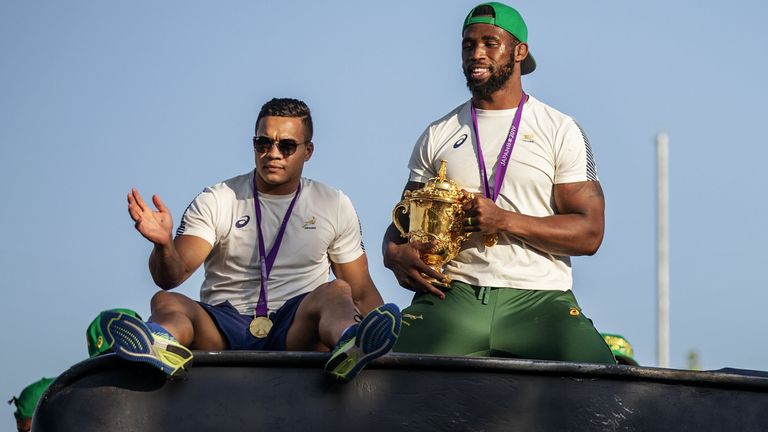
Cheslin Kolbe and Siya Kolisi celebrate the Springboks’ World Cup win in 2019
“Myself and my wife were supporters in the stand, cheering and shouting for whatever happened during that England series.”
Kolbe had become accustomed to being overlooked by the Springboks, constantly told he was not big enough to make it at international level by coaches and selectors – “and players that I played with,” he adds – but when Allister Coetzee took charge of the national team in 2016 there was a feeling the winger would finally get his chance.
Coetzee had been Kolbe’s coach at the Stormers where he had played since 2013, a mainstay of the side in the back three.
But when Kolbe was an unused squad member throughout all four games of South Africa’s winless end-of-year tour in 2016 that included an historic loss to Italy, he felt his Springbok chances fading. At the same time, Toulouse had come calling, and outside of rugby he and his wife were expecting their first child.
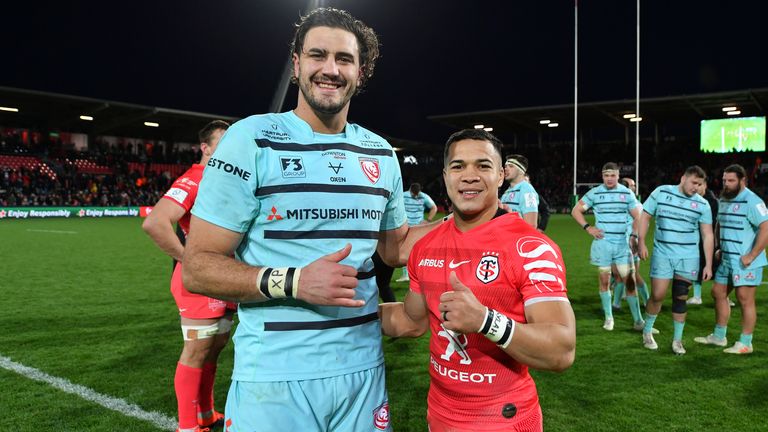
Kolbe poses with fellow South African Gerbrandt Grobler following a Champions Cup match between Toulouse and Gloucester – Kolbe had been told by many in South Africa that he was too small to make it at Test level
At the beginning of 2017, the Springboks instilled a 30-cap rule for which Kolbe fell short by precisely 30 caps, so he knew if he moved to France it would extinguish the last chance he had of representing his country.
“As much as I would have loved at that time to wear that green and gold jersey… I just couldn’t see myself sticking for so long,” he says.
“Knowing that I was going to be having a daughter soon, my family had to come first so that I can provide for them and give opportunities to them as well for their futures.”
In August 2017, the Kolbes packed up their Cape Town home and headed for Toulouse.
It was a difficult transition for two young parents in a country where they didn’t speak the language, but on the field Kolbe enjoyed life in the Top 14, where he was given more rope to play his natural game.
“The first game I played back in 2017, to be honest I didn’t know much! I didn’t know what the calls were,” he says.
“I literally just played on instinct, hoping not to make a mistake that would cost the team.
“But I had a bit of freedom to just express myself on the field, and that definitely gave me a bit of confidence.”
The confidence paid off as Kolbe scored six tries in his first eight games, with coach Ugo Mola describing him as someone who “fills stadiums” in an interview with Rugbyrama.
Toulouse’s season ended in a Top 14 play-off defeat to Castres in May 2018, and Kolbe spent the off-season in South Africa where he watched the Boks in Johannesburg under their new coach Erasmus.
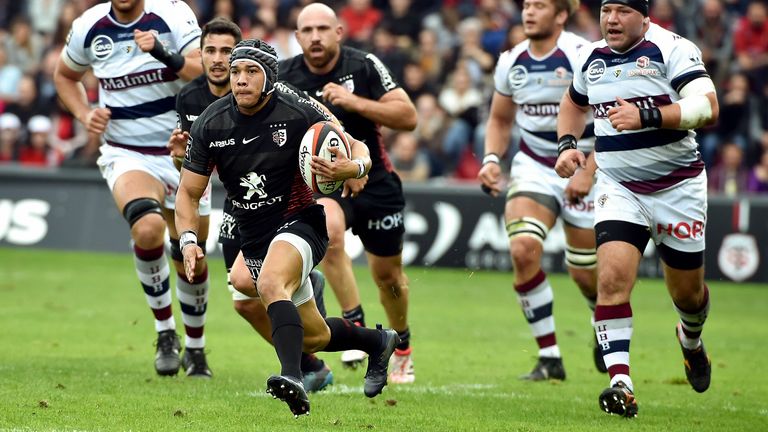
Cheslin Kolbe in action for Toulouse against Bordeaux-Begles in 2017
Erasmus had been given special dispensation from South African Rugby to pick overseas players as he had been given the job so near the World Cup. However, when Kolbe took his seat at Ellis Park that day in June it was a little over 14 months before the Springboks would board a plane for Japan, and given he had not had any contact from Erasmus or anyone else in the national setup, his international dreams remained shelved.
“A few months later things changed so much,” the 27-year-old says.
Toulouse started the 2018-19 Top 14 season with a draw against Lyon on August 25, and on Monday gathered for the team meeting – one which Kolbe will remember more than any other.
He recalls William Servat, then forwards coach of Toulouse, sitting next to him before it started and saying ‘now you can bring me some biltong’.
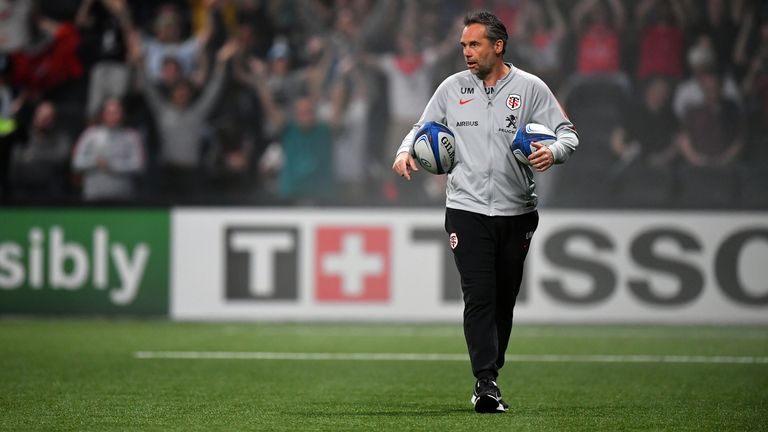
Toulouse coach Ugo Mola was the man who broke the news to Cheslin Kolbe that he had been called up by the Springboks
Kolbe innocently responded that he wouldn’t be in South Africa for a while but offered to ask his wife to bring some back for him. Servat looked at him blankly, got up and walked away.
At the end of the meeting, Mola asked the winger to stay behind for a private conversation.
“The season had just started,” Kolbe says, looking back. “I didn’t think I had that much of a bad game against Lyon, so I wasn’t sure what it could have been.”
Mola told him: “You won’t be playing this weekend, you got called up to join the Springboks in Australia.”
Kolbe called his wife to tell her the news, then phoned his father, Andrew, an inside centre whose own rugby career had been limited by a sport operating under an Apartheid regime.
Kolbe recalls: “The man just broke down into tears when I spoke to him.”
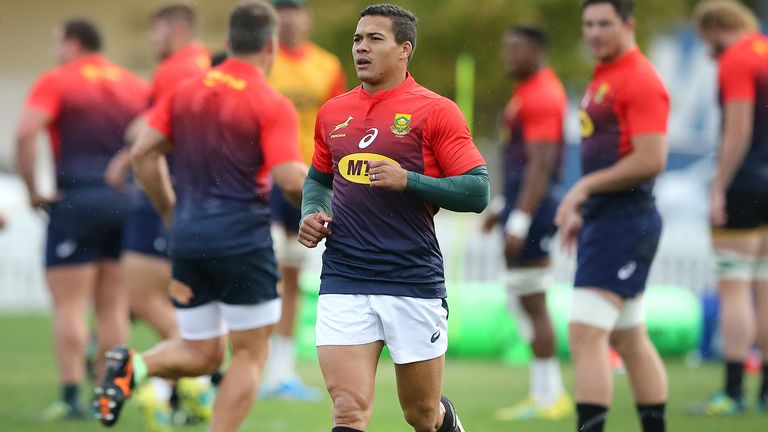
Cheslin Kolbe in training in Brisbane ahead of his Test debut against the Wallabies
“That was a really special day for me, just getting that news,” he continued. “Whether it was going to be that I played or just trained, just to receive news like that… was really good.”
Kolbe arrived in Brisbane for the Rugby Championship match knowing Makazole Mapimpi, Sbu Nkosi and Aphiwe Dyantyi – since banned from the game for doping – were ahead of him in the pecking order on the wing.
He was named on the bench against the Wallabies, and was so excited that after getting his jersey at the presentation, he slept with it in his bed that night.
He made his Test debut the first half of the 23-18 loss at Suncorp Stadium, but it was the following week in Wellington where he announced himself on the world stage against South Africa’s oldest rivals, the All Blacks.
“I remember during the match, the tackles, the impacts I heard from the sideline, I was like ‘wow, this is proper rugby’,” says Kolbe, who had been named on the bench for the second week running.
“Playing New Zealand in New Zealand makes it more special. Growing up as a kid watching them play; the style they play, the big athletes that they are, and knowing that I’m going to hopefully get an opportunity to play against these guys was something I looked forward to.
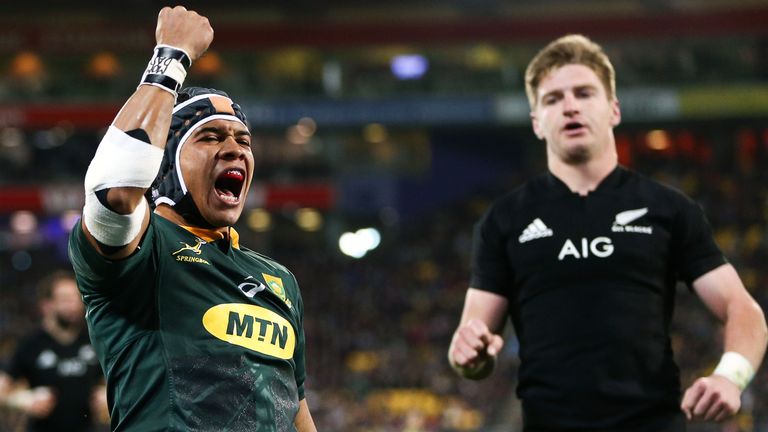
Cheslin Kolbe celebrates after scoring a try against the All Blacks in Wellington
“I wanted to measure myself against the top guys in the game.”
At half-time South Africa were 24-17 ahead, and Kolbe got the nod to start the second half on the wing.
“People probably were looking at me like ‘who the heck is this guy?’ Small. That’s probably what people were thinking.
“But I was so excited, I was so chuffed to get onto that field and just play rugby.”
It took Kolbe less than 90 seconds to make his presence felt. New Zealand were awarded a penalty and Aaron Smith took it quickly as play swept down the left of the field towards Kolbe’s side where there was space.
“We were a bit under the pump,” he says. “I had to make a decision whether I was going to shoot in or wait and bide time for the defenders on the inside.
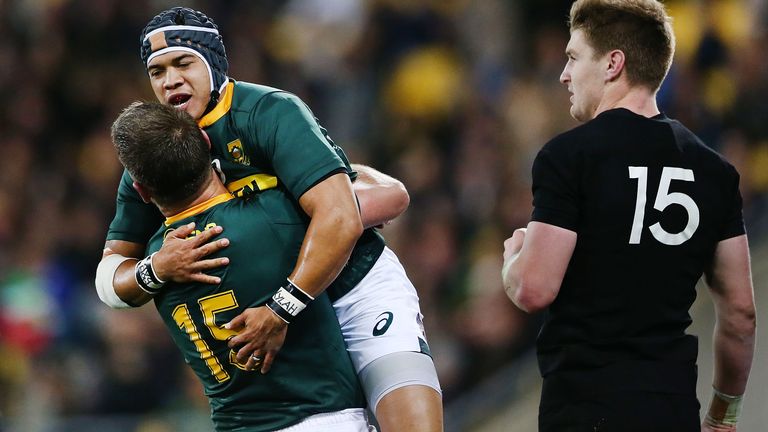
Cheslin Kolbe is congratulated by Willie le Roux after scoring his first Test try
“I saw Anton Lienert-Brown pumping the ball, and I faked to the inside and I just hoped he would pass. I stuck my hand out and I felt the ball in my hand, and literally just grabbed it and ran as fast as I could to the tryline.
“I probably could have gone under the posts, but the first thing to me was, just dot this ball down. That is a memory that will be with me for the rest of my life.”
The Springboks ended up beating the All Blacks 36-34 in what is seen as the turning point that gave them belief on their way to becoming world champions a year later, and for his own efforts, Kolbe was handed a starting berth in the final two games of the Rugby Championship.
The Boks finished second in the tournament and that was followed by an end-of-year tour that brought mixed results, but domestically Toulouse were on the rise as the season went into 2019. They won the Top 14, beating La Rochelle in the semi-final and Clermont in the final in June.
Back in South Africa, Kolbe started in two of the three Tests in the truncated Rugby Championship, and on August 26, almost exactly a year from the day Mola had told him he had been called up for the first time, Kolbe was named in South Africa’s World Cup squad.
“That was a special year for me with everything that happened,” he says. “A Top 14 victory with Toulouse, Rugby Championship with the Springboks and getting selected for the World Cup in Japan as well.
“I could only think of these kinds of things. I never thought that it would have happened that soon or that quickly for me to be honest.
“I never really thought about being part of the 2019 World Cup or getting a Test cap under Rassie Erasmus. God plans and sets out things for each and every person out there, and the opportunity just came up and it was up to me what I was going to do and make of it. I’m just glad that it came.”
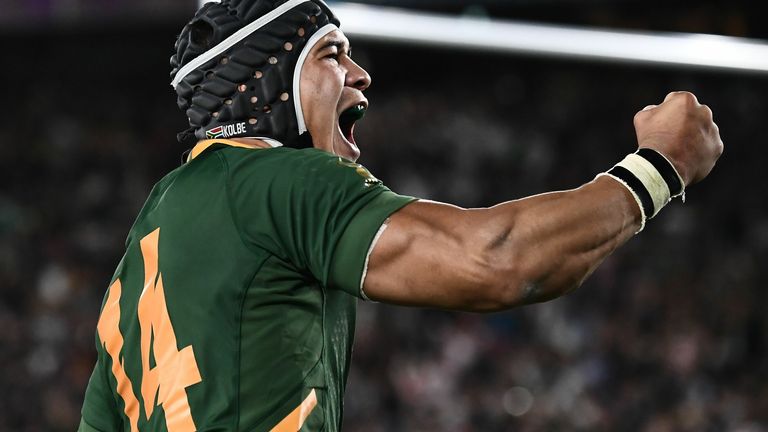
Cheslin Kolbe celebrates after scoring a try against England in the World Cup final
The man who grew up in a hostile area of South Africa’s Western Cape stopped short of saying his selection was vindication for the times people doubted him.
“I don’t get carried away by what other people think about me, or what they have to say,” he says. “Sometimes what they say actually does motivate me at the end of the day to prove them wrong.
“From where I come from, I know what the tough life is like, I know what it takes for someone to be down and out. I just picture where I want to be one day, what I want to achieve.”
What Kolbe wants to achieve now is a Champions Cup title, having featured in the last two seasons’ semi-finals where Toulouse’s ambitions were ended by Leinster and Exeter respectively.
“I believe in this team,” he says. “The past two years we came close.
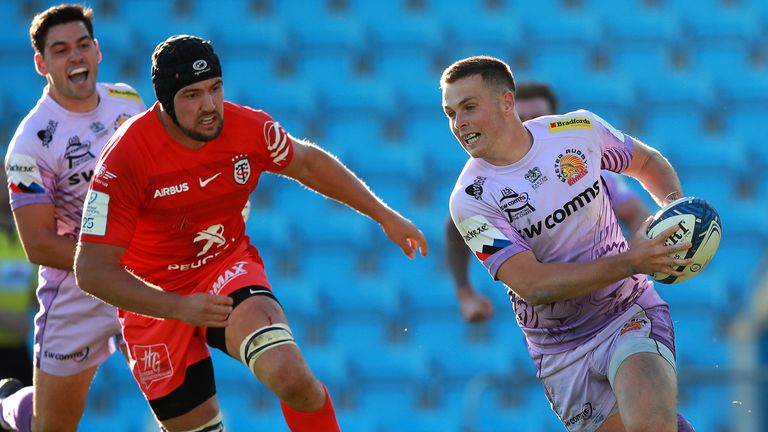
Toulouse were beaten by Exeter Chiefs in last season’s Champions Cup semi-finals
“It’s actually insane to see guys at the age of 20, 21, lifting their hand and playing the best rugby compared to the other players out there in the competition.
“It’s really exciting to see and I think the future of the club is in good hands.”
With the likes of Romain Ntamack and Antoine Dupont at the club – the scrum-half once again showing his talent with a superb individual try over Christmas – there is no question Toulouse are in good shape in their quest to add to their European titles.
And they are off to a good start in Europe this term. Kolbe scored twice in a 29-22 victory over Ulster in Belfast in the opening round, and a cancelled visit from Exeter in the second round put them tied at the top of Pool B – with a trip to Sandy Park scheduled for the third round.
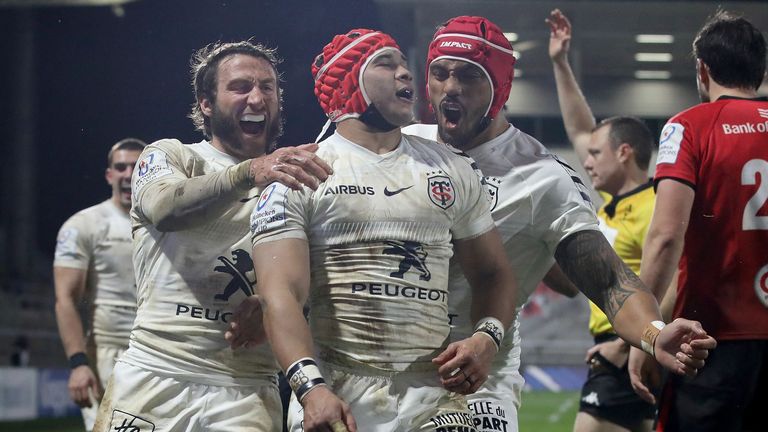
Cheslin Kolbe celebrates after scoring a try against Ulster in the Champions Cup earlier this month
For Kolbe, heading to Exeter to face the team that knocked them out of the competition last time out is a challenge he wants to see through.
“One hundred per cent,” he says when asked if he would prefer to play the Chiefs than get another default win. “We would rather play and get five points than just get given them like [in round two], but 2020 has been an interesting year with Covid and everything.”
With the coronavirus pandemic still causing so much disruption around the world, Kolbe is more determined than ever to play his part in trying to lift spirits in his adopted city and beyond.
“That’s why you’re playing this game,” he says. “You want to succeed in each and every way, but you also want to have a positive impact on other peoples’ lives as well, whether they can take something small out of it or something big that will make a massive difference in their future.
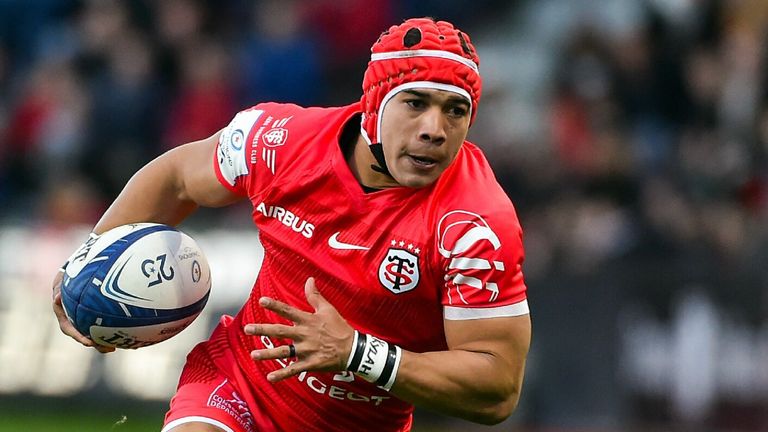
Cheslin Kolbe described Toulouse as a ‘family club’
“I go out on the field to perform the best that I can for myself and my team-mates, and then for other people that look up to me who are in difficult situations, to give them that hope and encouragement.”
For Kolbe, it’s about more than silverware to put against his name. He has not forgotten how he was enveloped when he and his wife arrived with their four-month-old child in the city three-and-a-half years ago.
“We are part of a really special club and special city as well,” he says. “For us it’s basically a family club; everybody looks after each other.
“Whenever you need assistance with anything, someone will always be ready to give you a hand. It’s just the relationship you have with not just the players but all the people at the club.
“It’s really good. You get to know people personally, where they come from, what they do and all those kinds of things.
“It’s not just rugby,” he adds. “It’s way more than that. Hopefully we can make this club and its supporters proud.”



